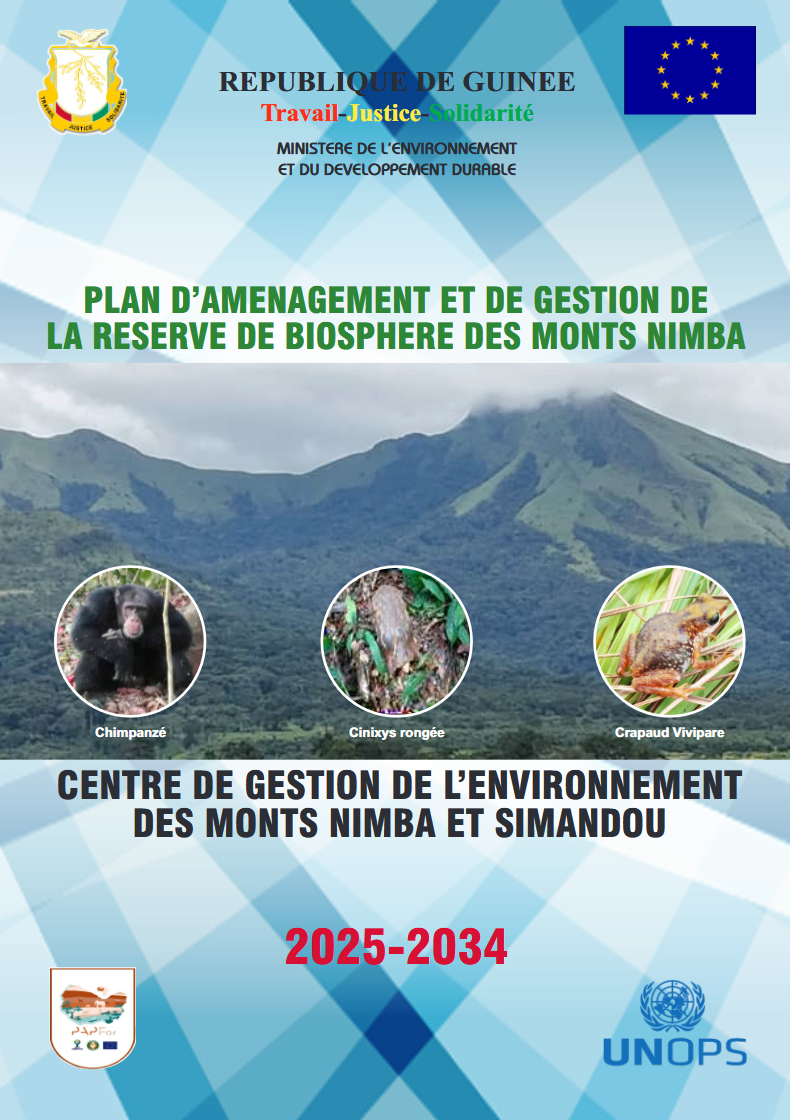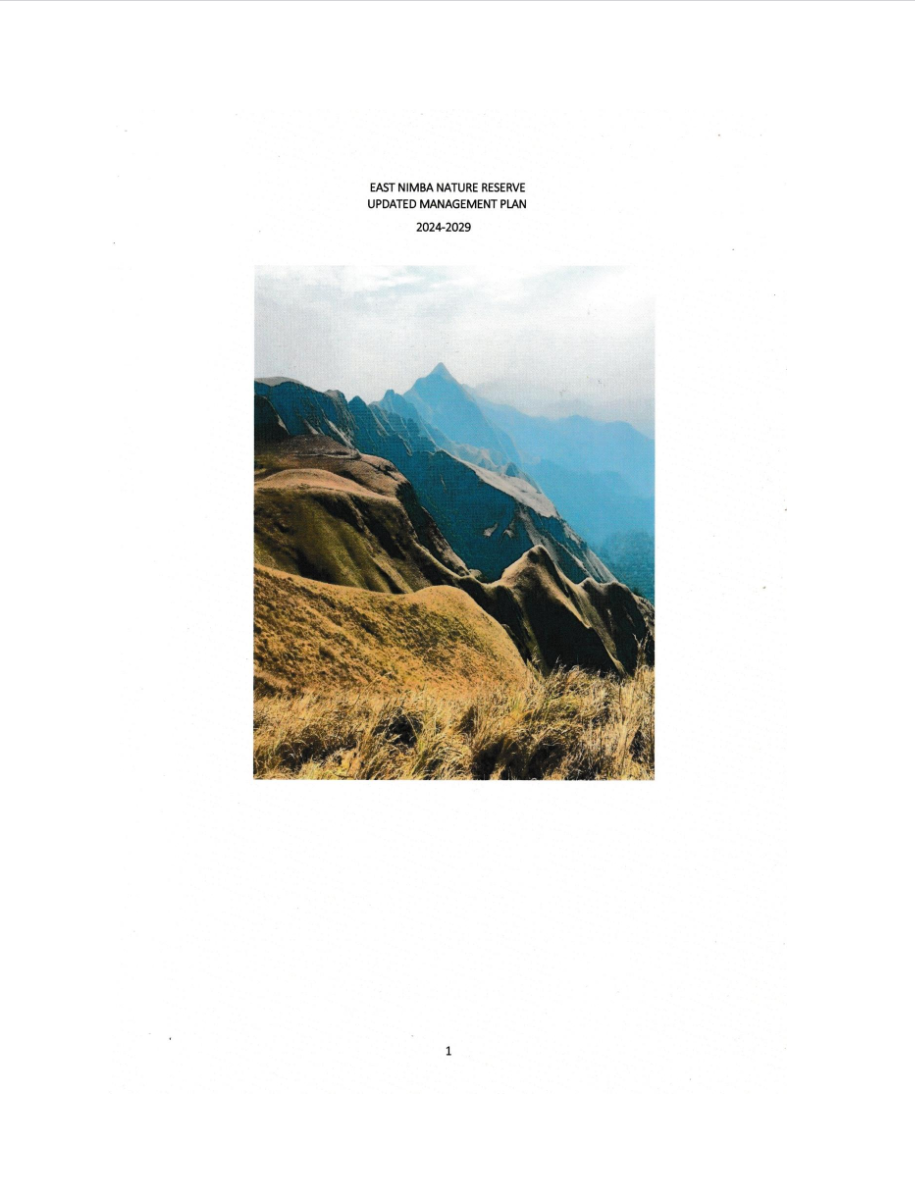Shared between Côte d’Ivoire, Guinea and Liberia, the Mount Nimba landscape has a wide variety of habitats, from dense rainforest to mountain grasslands, spread over an altitudinal gradient from 400 to 1 750 m. It is a unique centre of endemism for many plant and animal taxa, including the world’s only viviparous toad (Nimbaphrynoides occidentalis) and a species of bat (Myotis nimbaensis) discovered in 2018. The Guinean and Ivorian sections are a UNESCO World Heritage Site and, with its unique biodiversity and mountain landscapes, the landscape has great potential for tourism.
Mont Nimba
The PAPFor project in Mount Nimba landscape
The PAPFor project started in the Mount Nimba landscape in January 2021.
It aims to effectively, efficiently and legally protect the biodiversity and ecosystems of the Mount Nimba landscape in the three countries involved (Côte d’Ivoire, Guinea and Liberia).
The expected results are:
- The integration of socio-economic and environmental forestry activities into land-use planning.
- The development of effective management systems for protected areas that include local populations.
- Sustainable rural development in association with local populations.
Update of management plans for 3 protected areas
Thanks to support from the PAPFor programme, the management plans for the 3 reserves (Mt Nimba Strict Nature Reserve in Guinea, East Nimba Nature Reserve in Liberia and Mt Nimba Integral Reserve in Côte d’Ivoire) have been updated. These tools set out the objectives and activities to be implemented over the next few years to ensure the effective and sustainable management of the protected areas.
Development of income-generating activities in Guinea
In Guinea, PAPFor has supported 6 local groups in the rural districts of N’Zoo Centre, Kéoulenta, Bossou Centre, Séringbara, Tounkarata Centre and Iro. The groups received agricultural inputs and equipment to plant market garden crops, perennial crops and cash crops, and to manufacture soap in order to improve their economic living conditions.
The activities were selected on the basis of local development plans (LDPs) drawn up at the start of the project by the communities, in collaboration with and with the support of PAPFor.
They will enable the communities to reduce the threats to the reserve and improve food security by increasing food production in the region. One of the beneficiary groups has taken the initiative to develop a pig farm, which it feeds with palm nut residues.
For more information:
https://www.papfor.org/Nimba-Local-Development-Plans-LDPs-officially-handed-to-3-project-communities
https://www.papfor.org/PAPFor-supports-local-groups-to-implement-income-generating-activities-around
Development of income-generating activities in Liberia
In Liberia, PAPFor has supported 6 communities in the development of income-generating activities. The villages of Sentontuo and Zolowee received inputs and equipment for growing cassava and market vegetables; a group in Bassa Village received building materials for a pigsty and 8 breeding pigs; and two poultry farms were set up in the villages of Zortapa and Camp-4. For these, PAPFor financed the construction of the hen houses, the purchase of 2 800 chicks and the provision of feed for the first few months of rearing. At the same time, the beneficiaries began growing maize to ensure that the poultry would be fed in the long term. The Gbapa group received building materials for a storage warehouse and a fish farm with 80 kg of live tilapia fish seed.
Development of income-generating activities in Côte d’Ivoire
In Côte d’Ivoire, PAPFor has supported the development of fishing, pig farming and beekeeping.
A total of four communities have benefited from this support, namely those of Gbapleu, Bouan-houyé, Kpoleu in the Kouan-houlé sub-prefecture and Danipleu in the Gbon-houyé sub-prefecture.
With regard to beekeeping, the project has provided a range of equipment (beekeepers’ outfits, tools, hive stands, honey presses, maturation barrels, etc.) which has enabled 40 hives to be installed.
For pig and poultry farming, the programme supported the construction of pigsties and hen rearing units. The equipment was supplied by the project, while the communities provided basic materials and labour. The pilot pig-rearing unit has six animals, and all medicines and vaccines have been provided, as well as feed for the first few months while the crops develop to take over. The programme has also supported training in animal husbandry and management.
Construction of a base camp in Gbakoré
In Guinea, PAPFor has rehabilitated and completed the living base for the nature conservationists of Monts Nimba, located in Gbakoré, in the buffer zone of the Mount Nimba Biosphere Reserve in Gbakoré, 2 km from the town centre and 4 km from the Central Area.
The work included refurbishing the sanitary block, the generator shelter, the administrative office, the accommodation for the chief curator and the deputy chief curator, and the complete installation of the electricity network and sewerage system.
For more information: https://www.papfor.org/Major-renovation-is-completed-at-rangers-base-camp-for-Mount-Nimba-Guinea
Support for PA surveillance patrols
In addition to training, PAPFor has also supported patrols to monitor protected areas in the 3 countries.
Equipment was distributed to the teams of eco-guards (tents, patrol outfits), as well as equipment for recording data in the field.
A total of 112 patrols were organised throughout the project, including 63 in Côte d’Ivoire, 32 in Guinea and 17 in Liberia.
Implementation partners
The PAPFor programme in the Mount Nimba landscape was implemented by UNOPS, with a field team based in Nzérékoré. Agreements with the agencies in charge of protected areas in each of the three countries (OIPR, CEGENS, FDA) have been established to ensure optimum ownership.




The Mount Nimba landscape will continue to be supported by the European Union as part of its NaturAfrica initiative.






















